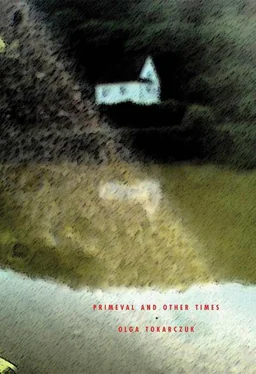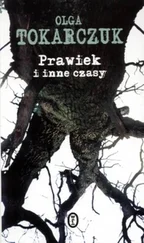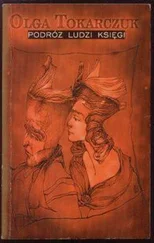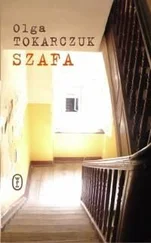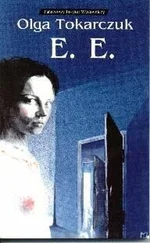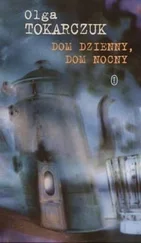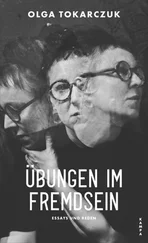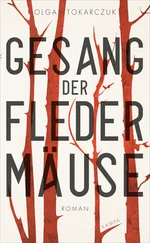“When are you coming to see me?” she asked as he got on his motorbike.
“Not now,” he said and kissed her on the lips.
That evening the girls’ temperature dropped, and next day they were well. Misia prayed to the Virgin Mary of Jeszkotle, Queen of Antibiotics, for this sudden recovery. In the night, once she had checked to see if their foreheads were cool, she slid under Paweł’s quilt and cuddled up to him as close as she could.
There are lime trees lining the Highway leading from Jeszkotle to the Kielce road. They looked the same at the beginning, and they will look the same at the end. They have thick trunks and roots that reach deep into the earth, where they meet the foundations of everything that lives. In winter their mighty boughs cast sharp shadows onto the snow and measure the hours of the short day. In spring the lime trees put out millions of green leaves that bring sunlight down to the earth. In summer their fragrant flowers attract swarms of insects. In autumn the lime trees add red and brown to the whole of Primeval.
Like all plants, the lime trees live an eternal dream, whose origin lies in the tree’s seeds. The dream does not grow or develop along with it, but is always exactly the same. The trees are trapped in space, but not in time. They are liberated from time by their dream, which is eternal. Feelings do not grow in it, as they do in animals’ dreams, nor do images appear in it, as they do in people’s dreams.
Trees live thanks to matter, by absorbing juices that flow from deep in the ground and by turning their leaves to the sunlight. The tree’s soul rests after going through many existences. The tree only experiences the world thanks to matter. For a tree, a storm is a warm-and-cold, idle-and-violent stream. When it gathers, the whole world becomes a storm. For the tree there is no world before or after the storm.
In the fourfold changes of the seasons the tree is unaware that time exists and that the seasons come in succession. For the tree all four qualities exist at once. Winter is part of summer, and autumn is part of spring. Cold is part of hot, and death is part of birth. Fire is part of water, and earth is part of air.
To trees people seem eternal – they have always been walking through the shade of the lime trees on the Highway, neither frozen still nor in motion. For trees people exist eternally, but that means just the same as if they had never existed.
The crash of axes and the rumble of thunder disturb the trees’ eternal dream. What people call their death is just a temporary disruption of the dream. What people call the death of trees involves coming closer to the anxious existence of animals. For the clearer and stronger consciousness becomes, the more fear there is in it. But the trees never reach the kingdom of anxiety occupied by animals and people.
When a tree dies, its dream that has no meaning or impression is taken over by another tree. That is why trees never die. In ignorance of their own existence, they are liberated from time and death.
When Ruta left Primeval and it became clear she wasn’t coming back, Izydor decided to enter a monastery.
There were two monastic orders in Jeszkotle – a women’s and a men’s. The nuns ran an old people’s home. He often saw them taking their shopping home by bicycle. They tended the neglected graves at the cemetery. Their contrasting black-and-white habits stood out against the washed out greyness of the rest of the world.
The male order was called the Reformers of God. For a long time Izydor watched the sad, bleak building hidden behind a crumbling stone wall before setting off there. He noticed that the same two monks spent the whole time working in the garden. In silence they grew vegetables and white flowers. Only white ones – lilies, snowdrops, anemones, white peonies, and dahlias. One of the monks, who must have been the most important, made trips to the post office and did the shopping. The rest had to be shut in the mysterious interior forever. They devoted themselves to God. That was what Izydor liked best – to be separated from the world, deeply immersed in God. To get to know God, examine the order of the works He created, and finally answer the questions why Ruta had left, why his mother had fallen ill and died, why his father had died, why people and animals were killed in the war, and why God allowed evil and suffering.
If Izydor were accepted into the order, Paweł would no longer call him a scrounger. He would stop sneering at him and mocking him. Izydor wouldn’t have to keep seeing all the places that reminded him of Ruta.
He confided his plans to Misia. She burst out laughing.
“Give it a try,” she said, wiping a child’s bottom.
Next day he went to Jeszkotle and rang the old-fashioned bell at the monastery door. For a long time nothing happened – maybe it was a test of his patience. Finally, however, the bolt grated and an old man in a dark-grey habit, whom he had never seen before, opened the door to him.
Izydor said why he had come. The monk was not surprised and did not smile. He nodded and told Izydor to wait. Outside. The door grated shut. A quarter of an hour later it opened again, and Izydor was allowed to come inside. Now the monk led him along corridors, down stairs and up, all the way to a spacious, empty hall, where there was a desk and two chairs. After another ten minutes or so a different monk came into the hall, the one who went to the post office.
“I’d like to join the order,” declared Izydor.
“Why?” the monk simply asked.
Izydor cleared his throat.
“The woman I wanted to marry has left. My parents have died. I feel lonely and I yearn for God, although I don’t understand Him. I know we could have a closer relationship if I got to know Him better. I’d like to do that by reading books, in foreign languages, on various theories. However, the local library is poorly stocked…” Izydor had to refrain from complaining about the library. “But please do not think I would do nothing but read. I’d like to do something useful, and I know that this order, the Reformers of God, is exactly what I need. I’d like to make change for the better, to redress all manner of evil…”
The monk interrupted Izydor in mid-sentence.
“To change the world… you say. That’s very interesting, but unrealistic. The world is impossible to make better or worse. It is bound to remain just as it is.”
“Yes, but you are called reformers, aren’t you?”
“Oh, you have misunderstood, my dear boy. We have no intention of reforming the world in anybody’s name. We reform God.”
There was a moment’s silence.
“How can you reform God?” asked the surprised Izydor at last.
“You can. People change. Times change. Cars, satellites… God might sometimes seem… how should I put it, anachronistic, and He is too big, too mighty, and thus a touch indolent as well, to fit people’s imaginations.”
“I thought God was unchanging.”
“Each of us is wrong about something essential. That is a purely human trait. Saint Milo, the founder of our order, proved that if God were unchanging, if He came to a standstill, the world would cease to exist.”
“I don’t believe that,” said Izydor with conviction.
The monk stood up, so Izydor got up, too.
“Come back to us when you feel the need.”
“I don’t like it,” said Izydor to Misia when he went into the kitchen.
Then he lay down on his bed, which stood right in the centre of the attic, just under the skylight. The small rectangle of sky was like a picture, a holy picture that could hang in a church.
Whenever Izydor saw the sky and the four points of the compass he felt like praying, but the older he got, the harder it was for the words of the familiar prayers to come to his mind. Instead thoughts appeared in his head that made holes in his prayers and tore them to pieces. So he tried to concentrate and imagine the figure of an unchanging God in the starry picture. But his imagination always produced an image that his mind could not accept. Once it was an old man sprawling on a throne with such a cold, severe look on his face that Izydor instantly blinked and drove him out of the skylight frame. Another time God was a sort of wavering, fluttering spirit, so volatile and indefinite as to be unbearable. Sometimes underneath the figure of God there was someone real impersonating him, most often Paweł, and then Izydor lost the desire to pray. He sat on his bed and swung his legs in the air. And then he discovered that what he found difficult about God was God’s gender.
Читать дальше
